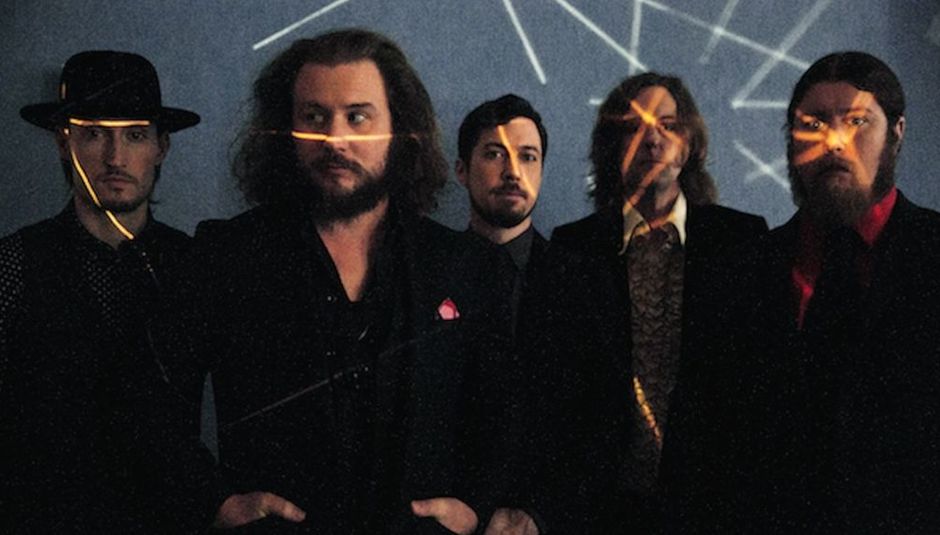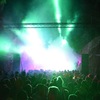“We hadn’t planned for it to sound this way or that, but we were in such beautiful surroundings. That must have had an impact.”
Four years ago, My Morning Jacket released Circuital, which - taken at face value at least - is probably their darkest-sounding record. The guitars were moody, the synths were sinister, and the overall atmosphere was one of paranoia and cluastrophobia; the Kentucky outfit had flirted with that particular rabbit hole before, but never actually jumped down it feet first.
In many ways, frontman Jim James is synonymous with the My Morning Jacket name; given that he’s chief lyricist and often the primary songwriter, anybody familiar with the circumstances of his post-Circuital life might have expected an even bleaker album this time out. Physically, he’s continued to have a rough time of it; his fall from an Iowa City stage in 2008, which left him with serious injuries, and the ensuing effect on his mental wellbeing had contributed to the feel of Circuital, and in the very early stages of the follow-up’s production, he suffered a herniated disc in his back that hindered his ability to participate in recording sessions in the picturesque coastal town of Stinson Beach, close to San Francisco.
In actual fact, though, The Waterfall is a radical sonic departure from its predecessor. It frequently sounds as carefree and airy as you’d expect from a record made with the beach on the band’s doorstep, and thematically, James has continued the ruminations on nature and spirituality that ran through his excellent 2013 solo LP, Regions of Light and Sound of God. That’s not to say that his typically sunny lyrical disposition continues unabated; ‘Big Decisions’ speaks of fatigue and disillusion, possibly with touring, whilst ‘Get the Point’ has him, disarmingly, dealing in out-and-out heartbreak. The result is the finest My Morning Jacket record in a decade, setting gorgeous soundscapes against complex metaphor and an uneven emotional outlook to spectacular effect.
DiS: The record’s been out a few months - how’s the response been?
Jim James: It’s been pretty good. Every time we put out a record out, it just does what it does. We’re always happy with it. There tends to be a bit of a split; there’s always older fans who might not be into it if we’ve moved in a new direction, but we usually pick up new ones, too. I mean, we’ve never had a hit single, or a mandatory government enforcement policy that forces people by law to like us, so we’re always stoked if people are listening. The fact that anybody’s doing so is cool.
What was the timeframe for this record? When did you get started?
I’ve got to be honest - I suck at remembering this stuff. There’s a certain rhythm to life in this band that means that, after two of three years, it’s time to make an album again. That’s certainly my tempo, because by that point I’ll have lived enough, or at least thought enough, to have something to write about. I put out a solo record in 2013, and probably a year later, we started out on The Waterfall. We wanted to take our time and not hurry through it. There was no end product in mind, just this huge pile of songs. We looked at it more as just us getting together to record, and then see where we ended up.
What made you decamp to Stinson Beach to record?
It’s really, really beautiful. There’s a really heightened sense of nature to it - you feel like you’re in a place that was touched by a magic wand. You can see the ocean from the tracking room, which was something I’d never experienced before. You just felt in touch with it the whole time. It’s surrounded by redwood forests, and they hold a lot of power. Every direction you walk in, it’s beautiful - the beach, the woods, the sunsets from the top of the mountain. It’s a special place.
Did the environment rub off on the sound of the record? It’s very light and breezy, especially compared to how dark and claustrophobic Circuital felt.
I think so. It definitely felt that way to us, whilst we were there. That’s the interesting thing - it’s like you’re dealing with two realms when you make an album. There’s what your life had been like for the past two or three years, when you’re writing the material, and then there’s what your life is like when you’re actually recording it. There’s kind of a fine balance there, and sometimes that in itself brings a certain pressure, and a certain darkness. It was a relief to be in such a nice place, and it was definitely a happy time for us all as people because of that. I do think that made itself known on the record.
Was the move away from the sound of Circuital deliberate?
Nothing’s ever really a deliberate move for me, other than making a point of going somewhere different each time. That’s essential, I think, because of the way it changes your mindset and headspace. I used to have goals and concepts, but whenever I tried to write that way, it would never turn out how I’d envisioned it. These days, I just try to write melodies, and the songs come from there. I went in with thirty or so different pieces of music to work on this time, and we just approached them whichever way we saw fit on that particular day. It’s cool to have a different perspective on a song when you record it, as opposed to how you saw it when you wrote it. There’s a development there, that could be good or bad, depending on how your emotional life is going. Change is inevitable when you make a record, so having specific ideas in mind from the start seems a little pointless.
Tucker Martine took on production duties on both Circuital and The Waterfall - what it is about him that makes him such a good fit?
He’s just got really great ears. That, and he has our sense of humour, which is a rarity in itself given how strange it is. He slots right into our dynamic; he’s a joy to be around. He’s a considerate guy, very kind and very gentle, but he’s still honest enough to stand his ground if he doesn’t think something sounds good. He’s not a pushover. It’s hard to find somebody in that role who isn’t really ego-driven, honestly. You meet a lot of producers who will argue and fight with you for no good reason, just for the sake of their own ego, and Tucker doesn’t have that about him. He’s what I look for in a producer; somebody I can laugh and enjoy life with while we’re making a record, but isn’t just going to tell me everything sounds great if he doesn’t believe that’s the case.
The concept of nature seems to crop up throughout the record. Was that purely down to Stinson Beach, or were those ideas in place beforehand?
It’s funny - that wasn’t intentional either. Obviously, there was an impact in terms of where we were recording, but at the same time, those ideas were probably formed mostly in Louisville, Kentucky, where I live and write most of the songs. So you take those ideas that were born in Louisville out to Stinson Beach, and I guess the air there, and the magic of the natural surroundings, was so massive that they kind of developed from there.
In that respect, there’s always things that end up on a record that you can never really explain. There’s so many forces, in life in general, that we can’t make sense of; we don’t know why they come or why they go. There just seemed to be a lot of spirits in Stinson Beach that are very much in touch with nature. There’s such an incredible wisdom to nature, and mankind, over time, has thought that it can control that, but of course it always comes back, time and time again, to show us who’s boss. It’s difficult to understand who those ideas made it to the record when, really, it’s hard to understand them in the first place. Nature’s much bigger than us, and it’s part of whatever God is, or whatever the magic of the universe is. I’m a big walker, too - that’s always what gets me out of the studio - so given how much time I spent exploring Stinson Beach on foot, it’s probably no wonder that those things wove themselves into the record.
Spirituality seems like a major theme on The Waterfall, too - was that a continuation of what you were looking into and talking about on your solo album?
It’s just something I think about all the time. It definitely pops its head in and out, and I feel like its something that’s tied in with nature, love, music, and God, which have always been a big part of my thought processes. Nature and spirituality run through this record, for sure. You know, just those basic questions; why do we like certain things? Why do we fall in love with certain people? Why do we create what we create? Why do we go into our chosen career fields? There’s all these things that we try to figure out, and a lot of the time, people search for religion because they’re searching for explanations. That’s why you see people trying different religions, and trying out different forms of spirituality. That stuff is on my mind a lot - I find it endlessly fascinating, but I accept I’ll never know the answers. I don’t think any of us are supposed to know those answers, at least in this lifetime, so we have to make peace with it, and a lot of the ideas on this record are about letting people explore that on their own. There’s so much religious persecution in the world. So many people think they’re right, but why? There’s no way of proving it. Spirituality should be an individual process, and if it leads you to an organised religion, then great. I just wish there was a way for people to feel more free, and more at home on this planet. We all make it a lot harder for each other than it needs to be.
Rolling Stone reported in December that another My Morning Jacket record is due in 2016 - are those songs in the same vein as the ones on The Waterfall?
Not really. Once we had all the songs in front of us in the studio, the ones on The Waterfall just seemed to fit together in their own world. We could have thrown some of the others in, and made it a less cohesive record, made it a little more all over the place, but we didn’t think it would benefit the record to have any dramatic detours on it. I think this idea that there’s been two records all along kind of got out of hand, because I was talking to somebody about just how many songs we’d done. There were a lot left over that we really love and that will be on some other record, whether it’s the next My Morning Jacket one or something different. We didn’t intend to come out with a two-record set, or anything. We could have thrown a handful of them onto The Waterfall, but like I said, it would have changed the whole tone of the album; it would’ve ended up sounding more like Evil Urges. We really tried to make that one this choppy, jarring experience for the listener, with really heavy songs next to really quiet ones, but that wasn’t what we wanted this time around.
Are you still intending to put those songs out quickly, or are they likely to sit on the shelf until the time naturally comes for another record?
It’s just a case of us being at the mercy of time right now, because we’ve committed ourselves to touring for this record for a while. The goal was just to try to put another record out quicker than we had in the past, and that might still happen if we can get back into the studio quickly once the touring’s done. It’s a difficult thing to predict, because we also feel like we have a responsibility to give The Waterfall a fair shot, to get out all over the world and promote it properly. That’s why that two-to-three year cycle happens with such consistency for us, and for a lot of our friends, too. We’ll see what happens.
Would it go against your preference to make every record in a different place to use some of those unused Stinson Beach cuts on the next album?
Not necessarily. I think we just enjoy going somewhere new each time because it keeps things fun. If we did do more sessions for the next album, we probably would go someplace else again. Even then, not everything on The Waterfall was done in Stinson Beach - parts of it happened in Louisville, too, so I don’t think mixing and matching would really be an issue.
How’s your relationship with touring these days? Between the solo dates you played and everything that’s coming up with the band, you’ll barely have been off the road the last couple of years.
It’s a love/hate thing, for sure. I think most people say that. It’s a pretty brutal lifestyle, and there’s a lot of downtime and boredom. That’s before you take into account the sheer physical toll of travelling. The shows are a lot of fun to play, and we’re glad people still come out, but that’s two or three hours out of a twenty-four hour day, and the rest of the time, you’re just sitting around in a hotel room or a dressing room. It feels like you’re wasting a lot of time. A lot of my friends feel the same way I do - it’s hard to be productive on tour, because you’re always tired or disoriented. It’s not a natural existence, and your brain’s kind of constantly uncomfortable. I don’t think that’s a good thing in terms of getting some writing done.
On the other hand, I feel lucky to have been able to do it. We haven’t forgotten what the early days were like, when we’d be touring in the van and we’d play for three people, back when nobody gave a shit. A lot of bands don’t make it past that stage. I’m grateful that we did, but you start to ask yourself questions about life when you’ve done it for fifteen years. You start to wonder if it’s still worth it; I guess, for now, the answer’s yes.
The Waterfall is available now via ATO. My Morning Jacket play Shepherd’s Bush Empire on September 8th 2015.























